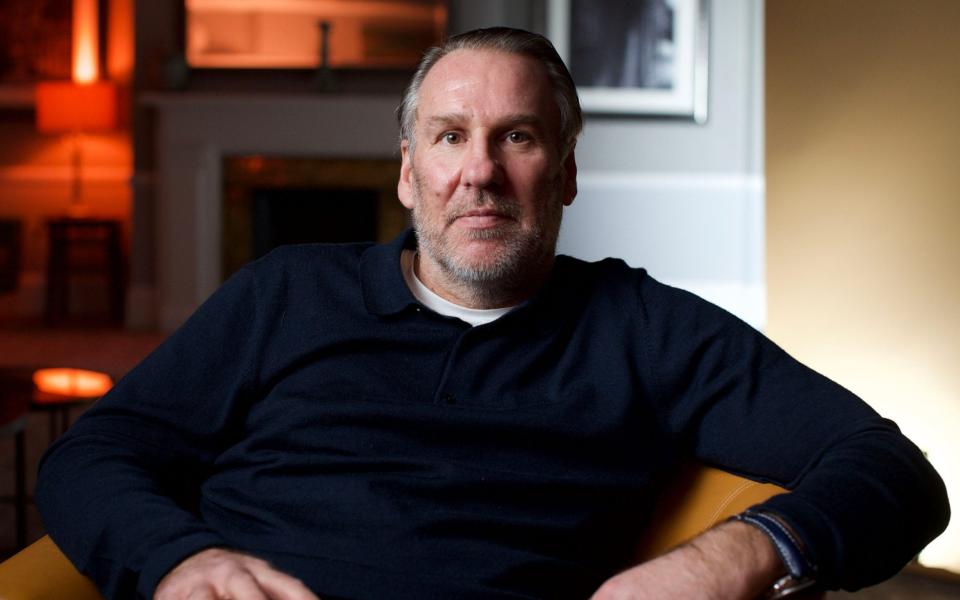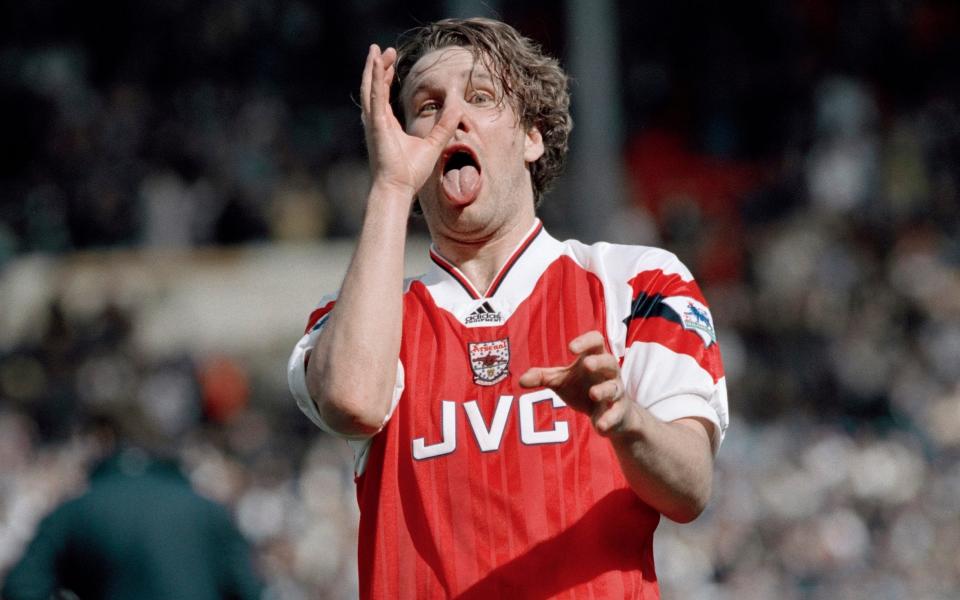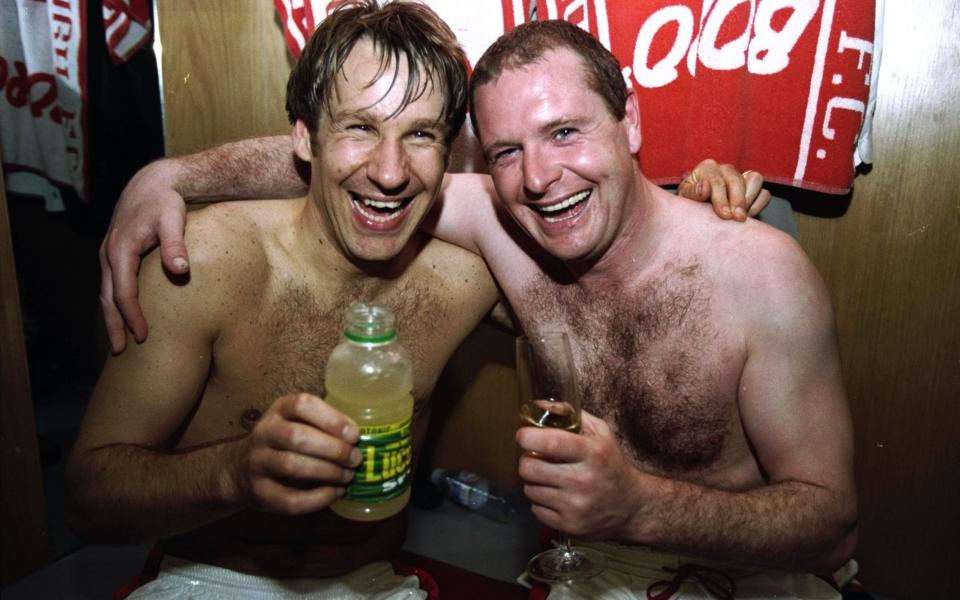Paul Merson interview: 'It was easier to kick cocaine and drinking habits than gambling addiction'

Paul Merson comes to the door of his house holding a baby. Somehow it is not what you expect of Paul Merson. A pint pot or a betting slip or a rolled up £20 note in his hand, perhaps. But, no, here he is with his eight-month-old daughter Sadie gurgling cheerfully in his arms.
“Wife’s at work, I’m on child care duty,” he explains. “We’ve just come back from a mother and baby dance class. Imagine that: me at a mother and baby dance class.”
He is right: it is hard to imagine. Because for most of his adult life Merson has been an exemplar of reckless self-indulgence.
That’s how we know him: doing the Merse on the pitch at Wembley, miming getting paralytic after an Arsenal cup final victory. Or lining up another gram in a pub toilet. Or spaffing £7million across a relentless, compulsive, 30-year gambling spree.
Now, at the age of 53, he has stopped all that. He gave up cocaine a long time ago, hasn’t touched alcohol for three years, and - most tellingly of all - he has not placed a bet in nearly 12 months. Suddenly, after spending his life in grim pursuit of his next high, he finds himself with time to devote to his young family.
“This is the happiest I’ve been,” he says as he makes his guest a cup of tea, Sadie still attached to his hip. “Now I’m in the moment, I can appreciate things. That’s my aim, live in the moment. I find it hard, really hard. I gambled and drank for all that time to take me out of the moment, now that’s where I want to be.”
And how Merson gambled and drank: for 36 years everything - work, football, domestic life - was secondary to the need to feed his addictions.
“I tell you what my Sundays used to be like until, well, not that long ago,” he says. “Soon as the pubs opened I’d be down there, saying to my wife: ‘see you at closing time’. And I’d take my phone charger with me so I could make sure my battery lasted all day so I could keep track of my bets.”
It is all there, in pained and embarrassed detail, in his freshly published autobiography 'Hooked'. An appropriate title, that: Merson was a man who lived to drink and bet and snort. And play the occasional game of football. His book is an extraordinary record of excess. He won two titles, the FA Cup and the League Cup on a diet of lager.

He snorted so much cocaine that for a while he was too paranoid to step outside his house. When he was 35 he was entitled to take out his PFA pension and gambled the lot, the full £750,000, within three months of receiving it. Now his attention is entirely directed to his three young children.
“Funny thing is, in my day in football everyone had kids at 21. George Graham used to reckon that it would calm you down. Didn’t really help me did it? Now they really help me. Now I make time for them.”
What he wants is for his book - written in conjunction with Telegraph Sport’s own Rob Bagchi - to act as an eye-opener for those in similar thrall to him.
“I went on Good Morning Britain and I was told Gamblers’ Anonymous had a major upturn in call numbers straight after. For me that’s everything. Money-wise this book isn’t going to get me out of rented accommodation. But money’s not my motivation.
“I did it because I need that one person to read this and then stop themselves going through what I went through for 36 years. If that happens, job done.”
On the surface, Merson has always been the most chatty and engaging character. It was those traits which landed him a job at Sky 14 years ago that he has retained despite his troubles - his happy-go-lucky, lad-next-door demeanour are a refreshing contrast to the increasing earnestness of the pundit class. But underneath, there was always trouble.
“When I was at Walsall, they put me in an Arizona clinic for the gambling,” he recalls. “The counsellor sat there playing my addiction. He’d be going ‘I will kill you, I will ruin you, I will take everything off you.’ Mind blowing. But my addiction ain’t like that. He talks to me nicely. My addiction’s my mate.”
Former Arsenal and England player Paul Merson lost £7 million during the 1990s from addiction to gambling and alcohol.
Paul describes the vicious cycle of gambling. pic.twitter.com/xMdKSmIJ4A— Good Morning Britain (@GMB) September 14, 2021
The voice in his head has always been with him, chatting. And 18 months ago, it started speaking loudly. He had not had a bet in a while, but the voice was persistent.
“I’d saved and saved and saved for a deposit for a house,” he explains. “Got into lockdown, anxiety and fear came in. I’m an addict, so I became addicted to the news. I got scared. There was a fear of never getting out of this. Fear I was going to lose my job. First thing comes into my head: you’ve got to gamble yourself out of this.
“I went on a spree and lost the lot. I think: 'You horrible f---. What have you done?' I’m looking at my kids and I want to leave a future for them and I’ve blown it overnight. It killed me. Now I have to start all over again.”
This time, supported by his wife Kate, he took proper counselling and returned to Gamblers Anonymous. He speaks with someone every day to help suppress his addiction.
“All my life I thought I was a bad person. Now I know I’m not well. It’s such a relief to know I’m ill and not the horrible man I hated.”

His illness comes in the form of that persuasive voice in his head. And the opportunity to follow the voice’s advice is constantly available.
“That’s a casino in your pocket,” he says, pointing to his phone. “They brought the rules out in 2005, but no-one had phones like this then. The technology now is scary. The rules have got to change.
“I have a thing on my phone which if you put in any betting company name, anything related to gambling, it will come up blank. But you have triggers left right and centre, adverts on the telly.
“Or I’m driving in my car taking the kids to school and I hear on the radio Man Utd are evens in tonight’s game. And my addiction will say to me: ‘evens eh? That ain’t bad, Paul. Have a little go on that. It won’t lead to anything’. But I know if I took it I’d be betting on Lithuanian Under-20s basketball within a week.”
Yet he works in a business that increasingly relies on the betting industry to bolster its income; most football shirts have bookies' logos on them while Jeff Stelling, his friend and colleague on Soccer Saturday, fronts a long-running advertising campaign for Sky Bet.

“My job is a trigger in itself, I accept that,” he says. “But I’m not a crusader. If I could bet normally I’d bet. Good luck to people who can do that, I don’t want to stop them. But there’s too many people out there like me and they need to be helped.
“Trouble is the industry makes too much money off them. Five per cent of people who bet are compulsive gamblers. But they account for 70 per cent of gambling company profits.”
This he says, is the issue: compulsive gambling traits are not hard to spot, yet little is done to help restrain them.
“I’m in the sports shop the other day buying a pair of trainers and I get a text from my bank refusing to let me spend £100 on my credit card,” he says. “So where were they when I was chucking ten grand at a time at the bookies? Puts it in perspective.
“Sporting Chance [the addiction charity founded by Merson’s old Arsenal team-mate Tony Adams] is now 70 per cent gambling. Betting on phone, it’s monopoly money. No-one is going into the bookies saying: here’s a grand in readies on someone to hold their next serve. On the phone, it’s easy. You do bets you’d never have done in a lifetime if you’d had to go into the bookies. And they let you do it.”
He knows at any time he might be pulled back into that compulsion. He treads, he says, constantly on eggshells. But right now, he is finding ways to distract himself. Largely by living life.
“I’m off to watch Freddie train tonight,” he says, of his son who is at Chelsea’s academy. “And I mean watch him. Couple of years back, I’d have been on the touchline but I’d have been staring at my phone. Now, I’m watching him all the time, living every kick. That’s my life now. And I tell you what: it’s a lot more fun.”
'Hooked: Addiction and the Long Road to Recovery' by Paul Merson is out now, published by Headline

 Yahoo Sport
Yahoo Sport 





































